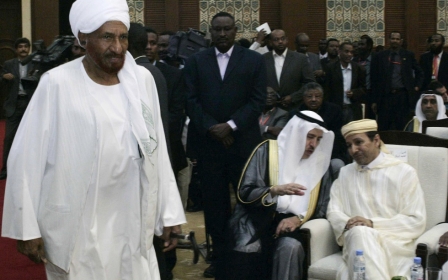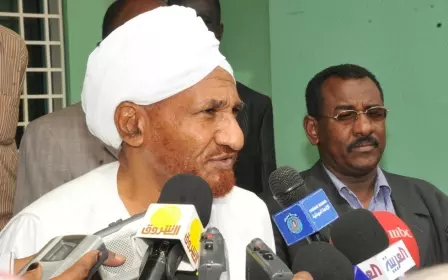Sudan bans reporting on case of detained opposition figure

Sudanese prosecutors banned journalists on 26 May from reporting on the case of former Prime Minister Sadiq al-Mahdi, who is being detained after accusing a counter-insurgency unit of committing abuses against civilians in Darfur.
Tuesday saw a wide range of Sudanese newspapers and news sites reporting the ban as front-page news.
Mahdi was arrested on 16 May after publicly accusing Sudanese Rapid Support Forces active in Darfur of a campaign of rape and abuse against the population.
His ongoing detention has sparked a domestic outcry, with hundreds rallying in the Sudanese capital on 23 May in support of the former Prime Minister and leader of the opposition Umma Party.
State security prosecutors banned the media from “dealing with the criminal case" against Mahdi, according to the official SUNA news agency.
New MEE newsletter: Jerusalem Dispatch
Sign up to get the latest insights and analysis on Israel-Palestine, alongside Turkey Unpacked and other MEE newsletters
The decision was made to avoid negatively affecting the investigation and the course of justice, it said.
Monday’s announcement is the latest in a series of government attempts to control the large number of opposition news outlets, after what was considered a period of relative press freedom since a programme of “national dialogue” began in January 2014.
20 May saw the National Intelligence and Security Service close down the widely-read newspaper al-Saiha, which had been publishing stories about allegations of corruption and abuse of power by government officials.
The Minister of Information and Press Ahmed Bilal Othman defended the decision on 22 May, and warned of further closures if newspapers continued crossing “red lines.”
In a statement to Parliament, Othman said that these red lines were set down not by the government but by the Sudanese constitution, adding that “without these fixed rules, there would be no state to talk about.”
The 20 May decision against al-Saiha prompted international watchdog Reporters Without Borders to warn of an “increasingly repressive attitude to the media” displayed by the Sudanese authorities.
'Unable to control' social media
Sudan’s Ministry of Communications stated on Monday that it is “unable to establish control” over these messaging sites like Facebook, Viber and WhatsApp.
The news site al-Nilin reports that the Minister of Communications, Tahani Abdullah, also accused sites like Facebook, Viber and WhatsApp of creating “security, economic and political problems” for the country.
In the same statement, the ministry announced that service will be cut from unregistered SIM cards at the end of May.
According to the daily Akhbar al-Yawm, the minister announced that 90% of SIM cards had been registered following “warnings” from the ministry in early May.
Registered SIM cards can be bought from official stores in Sudan, but buyers are required to have a photocopy of their passport taken, as well as giving a postal address.
However, unregistered SIM cards are widely available for purchase from street vendors.
Middle East Eye delivers independent and unrivalled coverage and analysis of the Middle East, North Africa and beyond. To learn more about republishing this content and the associated fees, please fill out this form. More about MEE can be found here.




